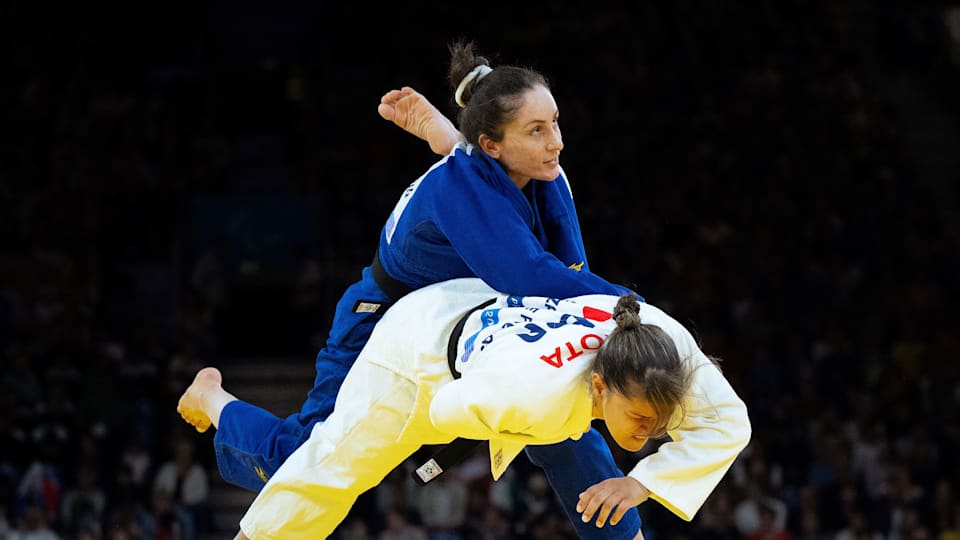Greek blind athlete-blind coach duo celebrate heartwarming milestone in Para judo

Theodora Paschalidou is fighting on the tatami at Champ-de-Mars Arena as her coach Theoklitos Papachristos gives her instructions from the sidelines.
The Greek Para judoka cannot see her opponent, and neither can her coach.
Fast forward one hour later and Paschalidou is standing on the podium, her fingers grazing the braille lettering on a bronze Paralympic medal while Papachristos visualises what the Greek flag looks like rising in front of packed stands.
Together, Paschalidou and Papachristos have become the first blind athlete and blind coach duo to win a Paralympic medal in Para judo.
“Dora is a very charismatic athlete and whatever I knew so far in all these years I have transferred it to Dora, and I feel like this medal is also mine,” Papachristos told Olympics.com after the medal ceremony.
His athlete quickly interjected: “It is first his and then mine.”
“He’s got great experience on the tatami. I admire him as an athlete and as a person," Paschalidou continued. "He makes me willing to pay attention and listen to him so we can fulfil our goal. He’s persistent and strict, but he always has understanding for everything that might come up. And I think that together we have the perfect cooperation and whatever we accomplish, we accomplish it together.”
Theodora Paschalidou carried the Greek flag at the Opening Ceremony of the Paris 2024 Paralympic Games, together with javelin thrower Emmanouil Stefanoudakis.
How a blind coach guides a blind athlete
Theoklitos Papachristos was 14 years old when he first stepped on a tatami. Another 14 years later, he made his Paralympic debut at Sydney 2000 and went on to compete in three more Games editions: Athens 2004, Beijing 2008 and Rio 2016. His best result was reaching the semi-finals at his first two Games.
Continuing to compete and coach until April 2024, Papachristos decided to make a full switch to coaching a few months before the Paris 2024 Paralympic Games and focus on supporting his long-time pupil Paschalidou.
The pair have been working together for almost 10 years – all this time without being able to see each other.
Instead of observing how his athlete moves on the tatami and giving her feedback, Papachristos needs to be on the mat too and use the sense of touch to understand how Paschalidou is performing the different techniques.
“It’s about the feeling,” he explained. “It’s very difficult because a coach who can see sees what the athlete does and tells them what to do in a right way. But in our case, we are together in sport, we are together as coach and athlete, and we are also friends, so we can make our faults right and that’s how we got here."
While the pair have good understanding in training sessions, things are more complicated during competitions where Papachristos needs to be in the coaches’ area. In these cases, the athlete-turned-coach relies on a third person to talk him through the action on the mat.
“I need someone to be beside me to describe the game and to also answer the questions I have, so that I can guide the athlete throughout the game,” Papachristos said.
New opportunities for veteran athletes: Greece’s revolutionary approach to Para judo
On Friday (6 August), Papachristos' guidance led Paschalidou to her first Paralympic medal, in the women’s -70kg J1.
"It’s my first Paralympic medal and I feel over the moon about it," Paschalidou said. "I have so much enthusiasm inside me and I feel so moved. I feel like my training so far and my attempts together with my coach have been right, by a large margin.”
Paschalidou had finished seventh in her Paralympic debut at Tokyo, and was emotional about receiving her first Paralympic hardware. Beyond a personal achievement, her medal also set two milestones for the sport and her nation – it was the first medal for Greece in Para judo at a Paralympic Games and the first medal for a blind Para judoka who is coached by a blind coach.
“It's something very important," Papachristos said. "It’s the first Paralympic medal of judo where both the athlete and the coach are blind, and they were at the same level with other names and they managed to take the podium.”
For Papachristos, the medal was an important way to show that sending a blind coach to a Paralympic Games can pay off.
The Hellenic Paralympic Committee is an innovator in that sense. They have sent not one but two blind athlete-coach pairs to the 2024 Paralympics: Emmanouela Masourou finished just off the podium on 5 September in the women’s -48kg J1, with the help of her blind coach Efstathios Panagiotis.
The fact that one of the two Greek pairs won a bronze medal is an even bigger accomplishment, and Papachristos hopes their success with Paschalidou will inspire other National Paralympic Committees (NPCs) to give veteran Para judokas a chance to stay involved in sport as coaches.
As for his partnership with the new Paralympic bronze medallist, Papachristos is determined to continue training together at least until the next Games at LA 2028 and, this time around, become the first blind athlete-coach duo to win a Paralympic gold medal.
“The next goal is to get back to where we started, keep training the way we did and the final goal would be LA,” he said. “We are expecting to be there. We’re looking forward to it. At the same time, we’re looking forward to being on the podium with another colour.”